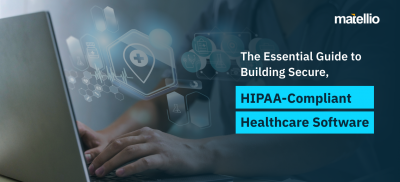
Medical coding is the backbone of healthcare billing and reimbursement, translating patient diagnoses, procedures, and services into standardized codes. These codes streamline communication between healthcare providers, insurance companies, and regulatory bodies, ensuring accurate billing and compliance. However, manual coding processes are prone to errors, inefficiencies, and regulatory challenges.
To overcome these limitations, investing in medical coding software development offers a digital solution that automates and enhances coding accuracy, compliance, and operational efficiency. This blog explores its significance, features, benefits, challenges, development steps, and future trends, highlighting why medical coding software is a vital tool for modern healthcare.
What Is Medical Coding Software?
Medical coding software is a specialized tool designed to automate and manage the process of assigning standardized medical codes to diagnoses, procedures, and services. Its primary purpose is to ensure accuracy, compliance with coding standards, and efficiency in revenue cycle management.
By integrating advanced technologies such as AI and automation, medical coding software supports healthcare providers in managing billing, compliance, and documentation seamlessly. It minimizes errors, speeds up claims processing, and enhances overall productivity in healthcare operations.
Source – Mordor Intelligence
Key Features of Medical Coding Software
Medical coding software combines traditional coding functionalities with cutting-edge technologies to meet the needs of modern healthcare facilities. Below is a table highlighting the core common features alongside next gen driven capabilities.
| Core Common Features | Next-Gen Driven Features |
| ICD, CPT, and HCPCS Code Libraries | AI-Powered Error Detection |
| Real-Time Coding Updates | Predictive Analytics for Claim Success |
| Integration with EHR and Billing Systems | Automated Compliance Audits |
| Customizable Reporting and Dashboards | Machine Learning-Enabled Code Optimization |
| Multi-User Accessibility with Role Permissions | Cloud-Based Deployment for Accessibility |
| Workflow Automation for Claims Submission | Real-Time Feedback and Insights |
| Audit Trail for Legal and Compliance Reviews | Integration with Advanced RPA Solutions |
To ensure healthcare organizations leverage these features effectively, technology consulting services play a vital role. These services guide facilities in adopting and optimizing medical coding software, ensuring seamless integration with existing systems and alignment with operational goals.
Enhance Your Recovery Rates with Our Tailored Medical Coding Software Solutions! Investing in medical coding software development is a transformative step for healthcare organizations aiming to enhance accuracy, compliance, and operational efficiency. This innovative solution addresses industry challenges while streamlining revenue cycle management, making it an essential tool in modern healthcare. Below are the detailed benefits of adopting medical coding software: Accurate medical coding is essential for minimizing claim rejections and ensuring proper reimbursement. Errors in manual processes, such as incorrect code assignments, can lead to financial losses and compliance issues. By integrating automated medical coding software, healthcare facilities can significantly reduce coding errors. These systems leverage real-time validation and built-in coding libraries, ensuring precise and error-free billing processes. Healthcare providers must comply with ever-changing regulations, including ICD updates and HIPAA standards. Non-compliance can result in fines, audits, and reputational damage. Medical billing and coding software solutions come equipped with automated compliance features, ensuring that all codes adhere to the latest regulatory standards. This reduces legal risks and enhances trust with insurers and patients. Delays in claims submission can disrupt cash flow and impact financial stability. Manual coding processes often contribute to these delays through inefficiencies and errors. Medical billing coding software automates claims submission workflows, reducing processing times and enabling faster reimbursements. Real-time coding feedback and automated tracking ensure smooth revenue cycle management. Administrative staff often spend excessive time on repetitive tasks like code validation, claims tracking, and error correction, leading to inefficiencies. With the help of software for medical billing and coding, healthcare facilities can automate repetitive processes. This not only enhances productivity but also allows staff to focus on strategic initiatives and improving patient care. Errors in coding and inefficiencies in the revenue cycle can lead to increased operational costs, including resubmissions and higher administrative expenses. Investing in medical coding and billing software minimizes costs by streamlining workflows and reducing claim rejections. Additionally, automated processes cut down the need for large administrative teams, ensuring long-term cost savings. Healthcare organizations often face challenges when scaling their operations, especially with outdated or rigid systems that cannot handle growing demands. Medical coding systems software is designed to grow with your facility. Its modular and customizable features enable healthcare providers to handle increasing patient volumes and integrate seamlessly with new technologies as needed. Access to accurate data and actionable insights is critical for improving financial performance and operational efficiency. However, manual processes often lack the tools needed for effective analytics. AI medical coding software provides advanced analytics capabilities, offering detailed reports on coding accuracy, claim trends, and financial metrics. These insights empower healthcare administrators to make data-driven decisions that optimize operations and enhance financial outcomes. Adopting medical coding software plays a pivotal role in driving digital transformation services for healthcare facilities. By automating workflows and integrating advanced technologies, organizations can transition from manual processes to streamlined digital operations. By leveraging digital transformation, healthcare providers can modernize their revenue cycle management, enhance patient experiences, and stay competitive in an evolving industry. Also Read: Discover how LLM in healthcare is revolutionizing patient care with advanced diagnostics, personalized treatment plans, and improved operational efficiency. Transform Your Healthcare Operations with Advanced Medical Coding Software! While medical coding software offers transformative benefits, its implementation requires addressing certain challenges that can hinder seamless adoption. Overcoming these hurdles ensures healthcare organizations maximize the software’s potential, enhance efficiency, and improve financial outcomes. Below is an in-depth exploration of these challenges and their solutions: Healthcare staff often resist adopting new technologies due to unfamiliarity with the software or fear of disrupting existing workflows. This resistance can delay implementation and affect efficiency. Comprehensive training programs can ease the transition, focusing on the software’s long-term benefits, such as improved accuracy and reduced workload. Engaging employees early in the adoption process helps foster enthusiasm and ownership of the new medical billing coding software, ensuring higher acceptance rates. Seamlessly integrating medical coding software with existing platforms such as EHRs, CRMs, or billing systems can be a complex process. Poor integration can lead to data silos and workflow inefficiencies. Developing flexible integration capabilities ensures smooth interoperability between the software for medical coding and existing systems. Leveraging APIs and middleware solutions enables a unified workflow, enhancing productivity and data accessibility. The upfront investment for purchasing, implementing, and training staff on medical coding software can be significant, particularly for smaller healthcare facilities. Adopting modular medical billing and coding software solutions allows facilities to implement critical features first, spreading costs over time. Flexible pricing models and phased rollouts help healthcare providers manage budgets effectively while maximizing ROI. Handling sensitive patient data during software implementation raises concerns about security breaches, compliance, and potential legal risks. Implement robust encryption protocols and adopt HIPAA-compliant practices to safeguard patient data. Partnering with a reliable healthcare software development company experienced in data security ensures the software is designed to meet industry standards, mitigating risks and ensuring trust. Off-the-shelf medical coding solutions may not address specific operational requirements, making it difficult to achieve desired efficiencies. Opt for custom-built software medical coding solutions tailored to your facility’s unique workflows. Customized software ensures better alignment with organizational goals, allowing for the inclusion of specialized features and streamlined processes. The healthcare industry frequently updates coding standards and regulations, such as ICD revisions, making it challenging for facilities to keep systems compliant. Incorporating automated updates into medical coding systems software ensures libraries remain current with the latest regulations. Working with vendors who prioritize compliance updates guarantees your coding practices remain accurate and lawful. Implementing new medical coding software can temporarily disrupt workflows, leading to delays and frustration among staff. Conduct parallel runs during the transition phase to minimize disruptions. Testing the software in smaller environments and gradually scaling up ensures that staff adapt to the medical billing and coding software without compromising ongoing operations. Involving key stakeholders during testing and rollout helps identify and address potential issues early. Rapid advancements in technologies like AI and machine learning can make some software solutions obsolete shortly after implementation. Choose AI medical coding software solutions that integrate machine learning capabilities for predictive analytics, error detection, and workflow optimization. Staying ahead of technological trends ensures long-term relevance and improved operational outcomes. Developing medical coding software requires a structured, well-planned approach to address the specific needs of healthcare facilities effectively. Each step is critical to ensuring the software is robust, scalable, and compliant with industry standards. Below is a detailed guide to the development process and how we assist at every stage: Understanding the unique requirements of the healthcare facility is crucial. This includes analyzing workflows, identifying pain points, and determining the software’s essential features, such as compliance needs and system integration capabilities. Our team collaborates with stakeholders to conduct in-depth analyses, ensuring the software aligns with operational goals. By incorporating insights from healthcare CRM software development, we ensure seamless integration with existing systems and enhanced patient data management. Establishing a clear project scope prevents delays and scope creep. This step includes defining deliverables, timelines, and resources and setting measurable objectives to guide the project. We create well-defined scopes for your custom enterprise software development projects, balancing ambitious goals with practical timelines. This ensures every aspect of the software development process is achievable and aligned with your expectations. The software’s interface must prioritize usability, enabling healthcare staff to navigate and operate it effortlessly. A user-friendly design ensures seamless adoption by reducing the learning curve. We focus on designing intuitive interfaces for medical billing coding software, enhancing usability for all users. Our approach ensures that workflows are simplified, making daily tasks more efficient and error-free for healthcare professionals. Building core functionalities, such as coding libraries, compliance tracking, claims automation, and reporting tools, is fundamental to the software’s success. Rigorous testing ensures these features perform reliably under real-world conditions. Our team develops and rigorously tests every feature of your software for medical coding, ensuring it is robust, reliable, and ready for deployment. Whether it’s automating claims processing or validating compliance, our solutions guarantee high performance. Incorporating next-gen technologies like AI and machine learning can significantly enhance software capabilities. Features such as predictive analytics, error detection, and real-time feedback improve accuracy and efficiency. We implement cutting-edge solutions, including AI medical coding software, to future-proof your system. By leveraging advanced technologies, we enable smarter coding processes and predictive decision-making for your healthcare organization. Handling sensitive patient data requires robust security measures and adherence to regulations like HIPAA. Compliance and security features, such as encryption and access control, are essential for protecting patient information. We design medical coding and billing software with integrated compliance and security measures. Our expertise ensures your software adheres to the latest regulatory standards while protecting sensitive data through advanced encryption protocols. Deploying the software involves rolling it out with minimal disruptions and training staff for effective use. Providing ongoing updates and support ensures the software evolves with the organization’s needs. We ensure seamless deployment of medical coding systems software, offering post-implementation training and ongoing support. Our continuous updates and optimization services help maintain high performance and alignment with industry advancements. Read More: Discover the key steps to creating efficient billing solutions in our blog, How to Develop a Medical Billing Software. The healthcare industry continues to evolve, and medical coding software is no exception. Innovations in technology are driving these systems to become more sophisticated, addressing emerging challenges and streamlining healthcare operations. Below, we explore the key trends shaping the future of medical coding software and their significance. Artificial Intelligence (AI) and automation are revolutionizing medical coding by enhancing efficiency and accuracy. AI-powered systems can automatically detect errors, suggest optimal codes, and predict coding patterns using advanced algorithms. These tools significantly reduce manual intervention and improve coding precision. With the integration of AI integration services, healthcare organizations can leverage intelligent tools to automate repetitive tasks, optimize workflows, and enhance decision-making in coding operations. Cloud deployment is transforming how medical coding software is accessed and managed. These solutions provide greater accessibility, scalability, and cost efficiency by enabling healthcare facilities to store and process data securely in the cloud. Cloud-based medical billing and coding software solutions allow healthcare professionals to work remotely while ensuring secure access to coding tools and patient data, enabling seamless collaboration and reducing infrastructure costs. Data-driven insights are becoming increasingly crucial in optimizing coding efficiency and improving financial outcomes. Advanced analytics features allow healthcare providers to identify patterns, analyze performance metrics, and make informed decisions. Integrating data analytics into medical coding billing software enables facilities to monitor revenue cycles, identify bottlenecks, and improve claim success rates by refining coding strategies. Regulatory standards in healthcare are constantly changing, and staying compliant can be challenging. Real-time compliance tracking automates the monitoring of updates to coding libraries and regulations, ensuring coding practices are always aligned with the latest standards. Including real-time compliance features in software for medical coding reduces the risk of penalties, legal issues, and claim denials, helping facilities maintain credibility and financial stability. Seamless integration with existing healthcare systems such as EHRs (Electronic Health Records), CRMs (Customer Relationship Management), and billing platforms is vital for creating unified workflows. Integrated systems eliminate data silos and improve coordination across departments. Medical billing coding software that integrates with existing platforms enhances overall operational efficiency, reduces duplication of effort, and ensures accurate data flow across systems. As healthcare facilities have unique operational requirements, customizable modules are becoming a necessity. Modular designs allow organizations to choose and adapt features that best suit their workflows and budgets. Customizable automated medical coding software ensures that facilities can scale their software with ease and adjust functionalities as their needs evolve, making it a cost-effective and flexible solution. Healthcare facilities are expanding, and their software needs to grow with them. Scalable coding solutions ensure that as patient volumes increase and technologies advance, the software remains efficient and effective. Scalable medical coding systems software helps healthcare providers future-proof their operations, ensuring uninterrupted performance and adaptability to technological advancements or increasing data loads. The Internet of Things (IoT) is making its way into medical coding software by enhancing connectivity between devices and systems. This allows real-time data exchange and more accurate coding practices. With IoT development services, facilities can create interconnected ecosystems where data from medical devices flows directly into coding systems, reducing manual entry errors and streamlining the entire process. Learn How Our Medical Coding Solutions Can Help You Improve Accuracy and Compliance! Efficient medical coding is critical for ensuring accurate billing, compliance, and streamlined operations in healthcare facilities. Investing in tailored medical coding software development can reduce errors, improve productivity, and ensure adherence to ever-changing regulations. Our medical coding software development services are designed to deliver innovative and customized solutions that meet the unique requirements of your healthcare organization. Our team of experts specializes in developing advanced medical coding software that integrates seamlessly with your existing systems. Leveraging cutting-edge technologies such as AI, automation, and real-time compliance tracking, we help healthcare providers transform their coding processes, enhance accuracy, and improve operational efficiency. If you’re ready to streamline your medical coding processes with innovative software, contact our team today by filling out the form, and let’s create a tailored solution for your needs! We implement real-time compliance tracking and automated updates to coding libraries, ensuring your software adheres to standards like ICD, CPT, and HIPAA. These features minimize compliance risks and enhance trust with patients and insurers. Yes, we specialize in seamless integrations with EHRs, CRMs, and billing platforms, enabling centralized workflows and improved operational efficiency. The timeline varies depending on the complexity and specific requirements of your project. After an initial consultation, we provided a detailed roadmap to ensure a timely and efficient rollout. Absolutely. We provide continuous support, including system updates, performance optimization, and user training, ensuring your software remains efficient and aligned with your goals. Costs depend on factors like project scope, complexity, and required features. We offer transparent pricing tailored to your budget, ensuring high ROI and value for your healthcare facility. Benefits of Investing in Medical Coding Software Development
 Enhanced Accuracy
Enhanced Accuracy  Improved Compliance
Improved Compliance  Faster Claims Processing
Faster Claims Processing  Operational Efficiency
Operational Efficiency  Cost Reduction
Cost Reduction  Scalability
Scalability  Better Decision-Making
Better Decision-Making  Supporting Digital Transformation
Supporting Digital Transformation Challenges in Implementing Medical Coding Software
Resistance to Change
Challenge
Solution
Integration with Existing Systems
Challenge
Solution
High Initial Costs
Challenge
Solution
Data Security Concerns
Challenge
Solution
Customization Needs
Challenge
Solution
Regulatory Compliance Updates
Challenge
Solution
Workflow Disruptions
Challenge
Solution
Keeping Up with Technology Advancements
Challenge
Solution

Steps to Develop Medical Coding Software
 Conduct a Comprehensive Needs Analysis
Conduct a Comprehensive Needs Analysis  Define the Project Scope
Define the Project Scope  Design User-Centric Interfaces
Design User-Centric Interfaces  Develop and Test Core Functionalities
Develop and Test Core Functionalities  Integrate Advanced Technologies
Integrate Advanced Technologies  Ensure Compliance and Security
Ensure Compliance and Security  Deploy and Provide Ongoing Support
Deploy and Provide Ongoing Support Future Trends in Medical Coding Software
 AI and Automation
AI and Automation  Cloud-Based Solutions
Cloud-Based Solutions  Enhanced Data Analytics
Enhanced Data Analytics ![]() Real-Time Compliance Tracking
Real-Time Compliance Tracking  Workflow Integration
Workflow Integration  Customizable Modules
Customizable Modules  Scalability for Growing Facilities
Scalability for Growing Facilities  IoT Integration for Improved Connectivity
IoT Integration for Improved Connectivity How Can We Help You with Medical Coding Software Development?
Here’s How We Can Help You:
Medical Coding Software – FAQ’s
Q1. How do you ensure compliance with medical coding software?
Q2. Can your software integrate with our existing systems?
Q3. What is the timeline for developing medical coding software?
Q4. Do you offer post-implementation support?
Q5. What are the costs of developing medical coding software?



